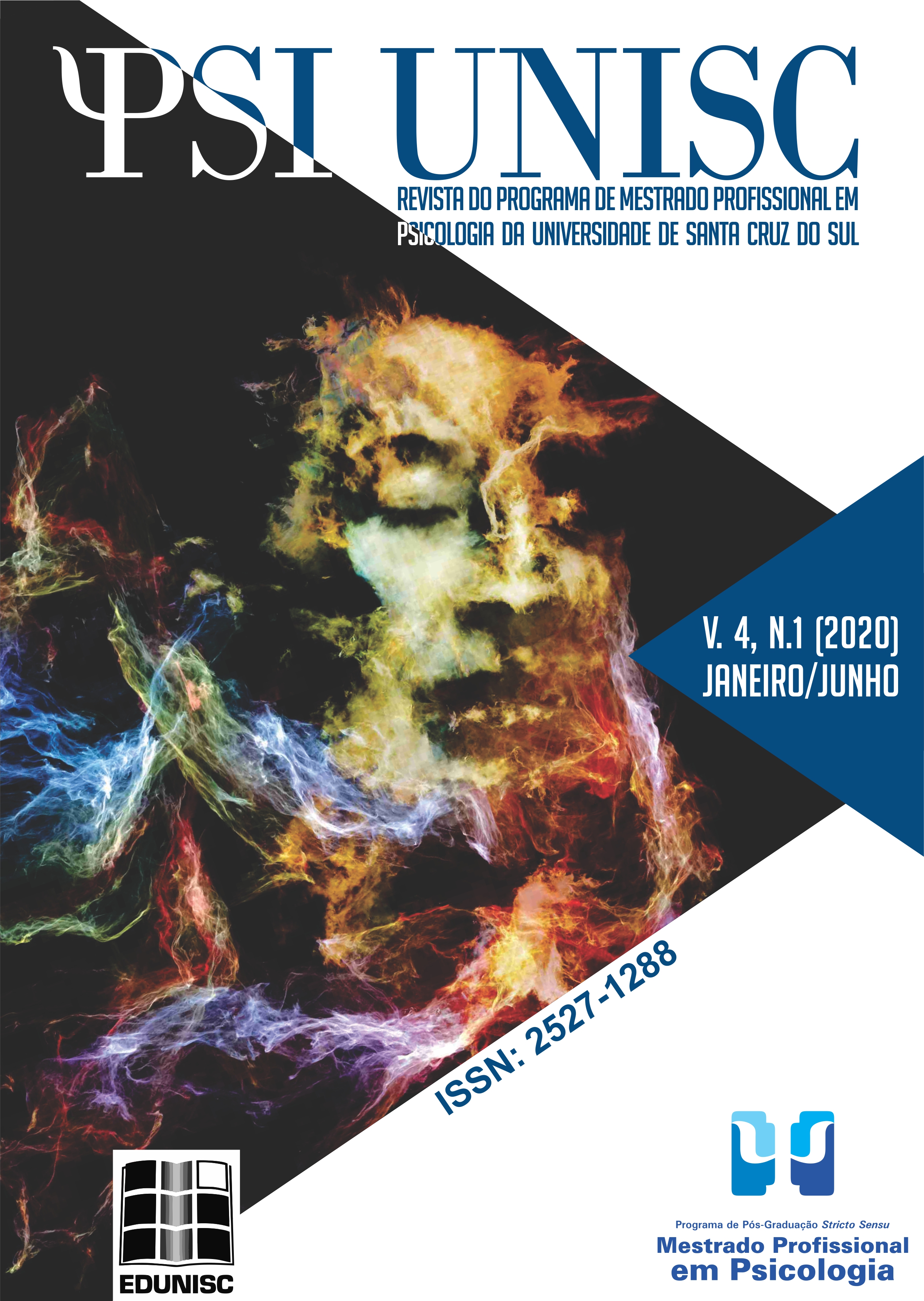Discussing Practices Criminalization of Social Movements: an Analysis Documentary
DOI:
https://doi.org/10.17058/psiunisc.v4i1.14115Keywords:
Criminalization, Social Movements, Citizenship, Biopower, Foucault.Abstract
This work had as the goal an analysis of a bibliographic survey and review about “Criminalization of Social Movements”. Were used to analyze dissertations found about this subject in the database of the Brazilian Digital Library of Theses and Dissertations (BDTD), in 2013. For undertaking analysis of the dissertations were used the clues left by the work undertaken by Michel Foucault through his archaeological and genealogical tools of analysis provided us with the possibility of a critique and questioning of discursive practices (knowledge) and non-discursive (power and subjectivity) that cross and make the studies analyzed, guided by the vision of a discontinuous history that triggers events in its uniqueness. We note that the series of jagged dissertations bring to the media, the judiciary, the police and government as key elements of a practice of criminalization of social movements, not forgetting to point resistance promoted by these groups against this process.This work had as the goal an analysis of a bibliographic survey and review about “Criminalization of Social Movements”. Were used to analyze dissertations found about this subject in the database of the Brazilian Digital Library of Theses and Dissertations (BDTD), in 2013. For undertaking analysis of the dissertations were used the clues left by the work undertaken by Michel Foucault through his archaeological and genealogical tools of analysis provided us with the possibility of a critique and questioning of discursive practices (knowledge) and non-discursive (power and subjectivity) that cross and make the studies analyzed, guided by the vision of a discontinuous history that triggers events in its uniqueness. We note that the series of jagged dissertations bring to the media, the judiciary, the police and government as key elements of a practice of criminalization of social movements, not forgetting to point resistance promoted by these groups against this process.Downloads
References
Avritzer, L. (2013). Impasses da democracia no Brasil. Sapere Aude, 7(14), 872-880. Recuperado de http://periodicos.pucminas.br/index.php/SapereAude/article/view/12217
Benford, R. D. (1997). An insider's critique of the social movement framing perspective. Sociological Inquiry, 67(4), 409-430. doi: 10.1111/j.1475-682X.1997.tb00445.x
Benford, R. D., & Snow, D. A. (2000). Framing Processes and Social Movements: an Overview and Assessment. Annual Review of Sociology, 26, 611–639. doi: 10.1146/annurev.soc.26.1.611
Carvalho, J. (2013). Cidadania no Brasil: o longo caminho (16ª ed.). Rio de Janeiro: Civilização Brasileira.
Castro, F. (2012). Comunicação, Poder e Democracia. Labor Edições.
Certeau, M. (1979). A operação histórica. In J. Le Goff, & P. Nora (Orgs.), História: Novos Problemas (2ª ed.). Rio de Janeiro: Francisco Alves.
Chauí, M. (2000). Brasil: mito fundador e sociedade autoritária. São Paulo: Perseu Abramo.
Chauí, M. (1996). Conformismo e Resistência: aspectos da cultura popular no Brasil (6ª ed.). São Paulo: Brasiliense.
Coimbra, C. (2001). Mídia e produção de modos de existência. Psicologia: Teoria e Pesquisa, 17(1), 1-4. doi: 10.1590/S0102-37722001000100002
Coimbra, C., Lobo, L., & Nascimento, M. (2008). Por uma invenção ética para os Direitos HumanosFor an ethical invention for Human Rights. Psicologia Clínica, 20(2), 89-102. doi: 10.1590/S0103-56652008000200007
Diani, M. (1992). The Concept of Social Movement. The Sociological Review, 40(1), 1–25. doi: 10.1111/j.1467-954X.1992.tb02943.x
Diani, M. (1997). Social movements and social capital: a network perspective on movement outcomes. Mobilization, 2(2), 127-147. Recuperado de https://mobilizationjournal.org/doi/abs/10.17813/maiq.2.2.w6087622383h4341
Fonseca, L. M. (2009). Ciberativismo e MST: o MST sobre a reforma agrária na nova esfera pública interconectada. 116 f. Dissertação (Mestrado em Comunicação) – Universidade Federal da Paraíba, João Pessoa.
Foucault, M. (1999). Em defesa da Sociedade: Curso no Collége de France (1975-1976, 3. ed.). São Paulo: Martins Fontes.
Foucault, M. (2012). Nietzsche, a genealogia e a história. In M. Foucault. Microfísica do Poder (25 ed.). São Paulo: Graal.
Foucault, M. (2010). O Sujeito e o Poder. In H. Dreyfus, & P. Rabinow. Michel Foucault. Uma trajetória filosófica: para além do estruturalismo e da hermenêutica. Rio de Janeiro: Forense Universitária.
Guareschi, P. (2006). Mídia e Cidadania. Conexão – Comunicação e Cultura (UCS), 5(9), 27-40. Recuperado de http://www.ucs.br/etc/revistas/index.php/conexao/article/view/202
Guattari, F., & Rolnik, S. (2005). Cultura um conceito reacionário. In F. Guattari, & S. Rolnik. Micropolítica: cartografias do desejo (7ª ed.). Petrópolis, RJ: Vozes.
Gohn, M. (2001). História dos Movimentos e Lutas Sociais: A construção da cidadania dos brasileiros. São Paulo: Edições Loyola.
Gohn, M. (2010). Movimentos sociais e redes de mobilizações civis no Brasil contemporâneo. Petrópolis, RJ: Vozes.
Gohn, M. (2012). Novas Teorias dos Movimentos Sociais (4ª Ed.). São Paulo: Edições Loyola.
Harvey, D., Teles, E., Sader, E., Alves, G., Carneiro, H. S., Wallerstien, I.,... Safatle, V. (2012). Occupy: movimentos de protesto que tomaram as ruas. São Paulo: Boitempo: Carta Maior.
Leão, M. A. S. (2008). Defensores de direitos humanos. In Centro de Estudos e Defesa do Negro no Estado do Pará (org.), Em Defesa da vida: a realidade dos/as defensores/as de direitos humanos sob situação de risco e ameaça no Estado do Pará (pp. 97-177). Belém: CEDENPA.
Lemos, F. C.S.; Cardoso, H. R. Jr. (2008). A genealogia em Foucault: uma trajetoria. Psicologia & Sociedade, 21(3), 353-357. doi: 10.1590/S0102-71822009000300008
Lima, A. C. S. (2015). Sobre Tutela e Participação: Povos Indigenas e Formas de Governo no Brasil, Séculos XX/XXI. Mana, 21(2), 425-457. doi: 10.1590/0104-93132015v21n2p425
Sorj, B. (2004). A democracia inesperada: cidadania, direitos humanos e desigualdade social. Rio de Janeiro: Zahar.
Wacquant, L. (2003). Punir os pobres: a nova gestão da miséria nos Estados Unidos (2ª ed.). Rio de Janeiro: Revan.
Downloads
Published
How to Cite
Issue
Section
License
The submission of originals to this journal implies the transfer, by the authors, of the printed and digital publication rights. The copyrights for the published articles are those of the author, with periodical rights on the first publication. Authors may only use the same results in other publications clearly indicating this journal as the medium of the original publication. Because we are an open access journal, we allow free use of articles in educational and scientific applications provided the source is cited under the Creative Commons CC-BY license.




